基础英语2第五单元练习答案+Fourteen+Steps
- 格式:doc
- 大小:52.50 KB
- 文档页数:8
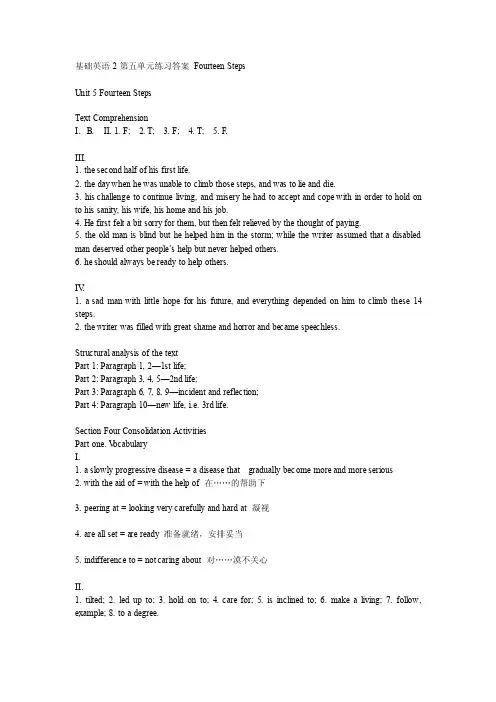
基础英语2第五单元练习答案Fourteen StepsUnit 5 Fourteen StepsText ComprehensionI.B. II. 1. F; 2. T; 3. F; 4. T; 5. F.III.1. the second half of his first life.2. the day when he was unable to climb those steps, and was to lie and die.3. his challenge to continue living, and misery he had to accept and cope with in order to hold on to his sanity, his wife, his home and his job.4. He first felt a bit sorry for them, but then felt relieved by the thought of paying.5. the old man is blind but he helped him in the storm; while the writer assumed that a disabled man deserved other people’s help but never helped others.6. he should always be ready to help others.IV.1. a sad man with little hope for his future, and everything depended on him to climb these 14 steps.2. the writer was filled with great shame and horror and became speechless.Structural analysis of the textPart 1: Paragraph 1, 2—1st life;Part 2: Paragraph 3, 4, 5—2nd life;Part 3: Paragraph 6, 7, 8, 9—incident and reflection;Part 4: Paragraph 10—new life, i.e. 3rd life.Section Four Consolidation ActivitiesPart one. V ocabularyI.1. a slowly progressive disease = a disease that gradually become more and more serious2. with the aid of = with the help of 在……的帮助下3. peering at = looking very carefully and hard at 凝视4. are all set = are ready 准备就绪,安排妥当5. indifference to = not caring about 对……漠不关心II.1. tilted;2. led up to;3. hold on to;4. care for;5. is inclined to;6. make a living;7. follow, example;8. to a degree.III. Word derivationFill in the blanks with the appropriate forms of the given words.1. Y ou always follow your own inclination (incline) instead of thinking of our feeling.2. The men stood in front of the bar, indifferent (indifference) to the argument that was going on across the road.3. The company has had a successful first year at home but penetration (penetrate) of the international market has been slow.4. We hadn’t seen her for many years and were very shocked by her frailty (frail).5. He does not consider his deafness an affliction (afflict).6. We were all very impressed by the excellence (excellent) of the design.7. Her fever is getting progressively (progress) worse. I think we should call a doctor.8. The honeymoon period was soon followed by the usual disillusionment (disillusion) with day-to-day reality.1. incline v. 使有……倾向,易于;爱好inclination n. 倾向,意愿inclined a. 有……倾向的;倾斜的2. indifference n. 不重视,无兴趣,漠不关心indifferent a. 漠不关心的,冷淡的indifferently ad. 不在乎地,冷淡地,淡然地3. penetrate v. 穿透,渗透;看穿penetrating a. 敏锐的,尖锐的;穿透的,透彻的penetration n. 渗透,侵入,突破4. frail a. 脆弱的,虚弱的frailty n. 脆弱,意志薄弱;弱点5. afflict v. 使苦恼,折磨affliction n. 痛苦,苦恼,苦难6. excellent a. 极好的,杰出的excellence n. 优秀,卓越,优点excellently ad. 优秀地,超群地7. progress n. 进步,发展,前进progression n. 前进progressive a. 前进的,渐进的8. disillusion n. 觉醒,幻灭disillusionment n. 幻灭感disillusioned a. 大失所望的,幻想破灭的1. A;2. C;3. B;4. D;5. B;6. A;7. D;8. B.V. Synonym / AntonymGive a synonym or an antonym of the word underlined in each sentence in the sense it is used. 1. And I managed to keep my health and optimism, to a degree, because of 14 steps. Antonym: pessimism2. Not so. Here hobbled a bitterly disillusioned cripple, a man who held on to his sanity and his wife and his home and his job because of 14 miserable steps leading up to the b ack door from his garage.Synonym: painfully, desperately3. She went into the house and a moment later came out bundled in raincoat and hat, followed by a man who called a cheerful greeting.Antonym: cheerless, unhappy, gloomy4. I started the engine and thumped slowly along, keeping well over on the shoulder until I came to the dirt road, where I turned in — thankfully.Synonym: fortunately5. He was an old man, stooped and frail-looking under his slicker.Synonym: weak, delicate, feeble6. As I became older, I became more disillusioned and frustrated.Synonym: disappointed7. I realized that I was filled to overflowing with self-pity, selfishness, indifference to the needs of others and thoughtlessness.Antonym: selflessness, unselfishness8. There followed a long interval of noises.Synonym: periodVI. CompoundingWrite in each space the meaning of each given word.1. likewise in the same way2. underway in progress3. carefree with no concern4. forthcoming coming soon5. stand-by something ready for use6. user-friendly handy to use7. soundproof preventing the passage of sound8. landlocked almost or entirely surrounded by landPart Two. Grammar Exercises1. NumeralsCardinal 基数numerals express integer 整数(whole) abstract numbers, or the number / amount of the determined nouns in literal form. In addition to being numerals determining nouns, cardinal numerals may also work as:1. adjectives2. nouns3. numeral ―one‖ can also be a pronounThe different ways to express ―around‖: around, a bout, nearly, some, more or less, or so, thereabouts, etc.Ordinal 序数numerals are used to express an / the order in a series. In addition to being numerals determining nouns, ordinal numerals may also work as:1. adjectives2. nouns3. adverbsOrdinal numerals allow both articles ahead. Again, the article determines the noun only, not the numeral.Fractional numeral is used to express parts of a whole. Commonly, it takes two forms:1. Common 普通分数/简分数fractionWork according to the formula: Wholes + Numerator / Denominatore. g. 1 2/3 = (is equal to or means) one (whole) and / plus two thirdsNote the ―s‖ added to the denominator: ―thirds‖.2. Decimal 小数numbersWork according to the formula: Whole numbers (point) decimalse. g. 12.15 = (is equal to or means) twelve fifteen, or twelve point fifteenI.different ways to express “around”.1. About 100 students;2. more or less 40 pages;3. There are 30 or so questions;4. two hours or thereabouts;5. some four miles;6. 50ish.II.1. a nap合一会儿眼;2. very good indeed百里挑一;3. in a mess乱七八糟;4. on hands and knees四脚爬;5. very much better than you are比你强十倍;6. talking quickly and continuously;7. very probably十有八九; 8. a lot ways千万条路子.III. Correct the errors in the following sentences.1. He was not due at the office for another three-quarter (attributive-adjective) (three quarters) of an hour.2. was –were.3. This is the worst disaster I can remember in my plus 25 years (25 years plus) as a police officer.4. second time –a second time.5. see –have seen. (present perfect)6. It took him one and a half hours to finish the task.7. Twenty-nine (beginning)2. Determiners (both, each, either or neither, some, any)Determiners are used in front of nouns to indicate whether you are referring to something specific or something of a particular type.Both is used to indicate that the action or state denoted by the verb applies individually to each of the two entities. When both is used with and to link parallel elements in a sentence, the words or phrases that follow them should correspond grammatically. Both can only collocate with plural count nouns.e. g. Both her fingers are broken.Both Mary and Tom like reading English novels.The phrase beginning with each identifies a set of items wherein the words following each identify the individual elements by their shared characteristics. The phrase is grammatically singular in number, so if the phrase is the subject of a sentence, its verb is conjugated into a third-person singular form. Similarly, any pronouns that refer to the noun phrase are singular.e. g. Each candidate has 49 votes.Each voter must decide for herself.Either and neither are used in sentences concerning a possible choice between two items. Either can mean one or the other (of two) or each of two.e.g. I’ve got tea and coffee, so you can have either. (on e or the other)The room has a door at either end. (both)Neither means not the first one and not the second one.e. g. Neither of the students were listening.Both, some and any appear before nouns. Some and any may be used with countable and uncountable nouns.e. g. He bought some sandwiches for lunch.He didn’t see any stars when he visited Hollywood.He ate some cheese with his sandwiches.He never drinks any coffee at night because then he can’t sleep.IV.Both, both, Neither, either, neither.both, each, either.V. Fill in each of the blanks with some, any or one of their compounds.1. somewhat2. The repairs will cost ____ something ____ in the region of $500.3. I was amazed that ____some_____ 400 people came to the meeting to discuss the new scheme for a shopping center.4. somehow, anything5. anything, something6. George ought to be able to tell whether that old plate is valuable. He is ___something___ of an expert on china.7. What have you been up to? I haven’t seen ___anything___ of yo u for ages.8. someVI.1. In spite of + noun--2. It seemed to me that + clause--Part Three. Translation exercisesI. English to Chinese1. 常言道猫有九命,我信这话。
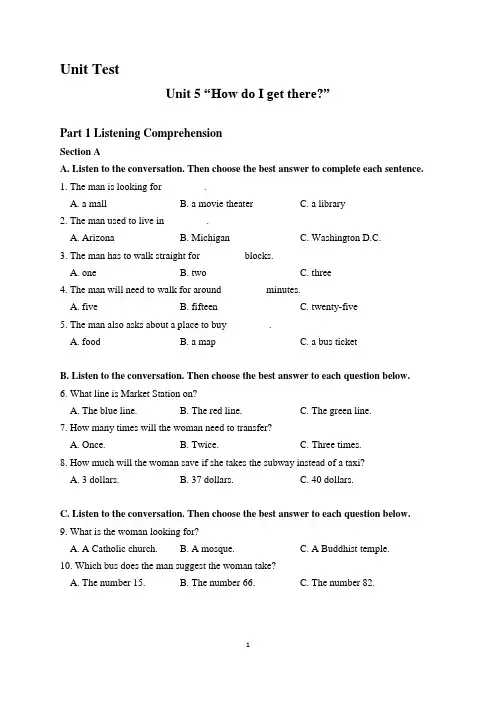
Unit TestUnit 5 “How do I get there?”Part 1 Listening ComprehensionSection AA. Listen to the conversation. Then choose the best answer to complete each sentence.1. The man is looking for ________.A. a mallB. a movie theaterC. a library2. The man used to live in ________.A. ArizonaB. MichiganC. WashingtonD.C.3. The man has to walk straight for ________ blocks.A. oneB. twoC. three4. The man will need to walk for around ________ minutes.A. fiveB. fifteenC. twenty-five5. The man also asks about a place to buy ________.A. foodB. a mapC. a bus ticketB. Listen to the conversation. Then choose the best answer to each question below.6. What line is Market Station on?A. The blue line.B. The red line.C. The green line.7. How many times will the woman need to transfer?A. Once.B. Twice.C. Three times.8. How much will the woman save if she takes the subway instead of a taxi?A. 3 dollars.B. 37 dollars.C. 40 dollars.C. Listen to the conversation. Then choose the best answer to each question below.9. What is the woman looking for?A. A Catholic church.B. A mosque.C. A Buddhist temple.10. Which bus does the man suggest the woman take?A. The number 15.B. The number 66.C. The number 82.Listen to the following sentences and write down what you hear on the lines.1.He’s always ____________ about the future. He thinks everything will be OK.2.When the economy is bad, there aren’t many job ____________.3.Why are you in such a ____________? Slow down!4.Anna is very ____________. She always expects the worst.5.There are many different ____________ you need to think about.Part 2 Vocabulary and StructureSection AA. Fill in the blanks with the words or expressions from the box.1.She walked four _________ down High Street.2.They put a screen _________ me, so I couldn’t see what was going on.3. A _________ is a small cheap restaurant that is open all day.4.He felt an overwhelming _________ of loss.5.Playing these games can _________ anti-social behavior.6.The tower on the hilltop is a well-known _________.7.A(n) _________ is someone who collects a particular thing.8.This problem is too _________ to be explained in a few words.9.The British _________ with the French in designing the satellite.10.It was the first time we _________ to ourselves that we were tired.Match the words to the definitions.1.museum2.elevator3.floor4.subway5.between A.into the space separating two or more objectsB.an underground railway system in a cityC. a building in which objects of artistic, cultural,historical or scientific interest are kept and shown to the publicD. a device that carries people up and down insidebuildingsE.level of buildingSection CChoose the best answer to complete each sentence.1. The girl is swimming __________ the pool.A. inB. atC. on2. It is the tallest building __________ the country.A. inB. atC. on3. What a coincidence! They live __________ the same block.A. forB. atC. on4. She will meet him __________ the wedding.A. inB. atC. on5. The bookstore is next __________ the subway station.A. atB. ofC. to6. Walk for three __________ and then turn left.A. blocksB. citiesC. diners7. Put the poster up __________ the wall.A. inB. atC. on8. The weather is very cold __________ the city of Heilongjiang during winter.A. inB. atC. on9. Leo is __________ home now. He’ll be here later.A. inB. atC. on10. There are some teaching materials __________ the table.A. inB. atC. onSection DComplete the passage, using the correct verb form.It’s said that up to 85 percent of the world’s population will be living in cities by the year 2050. So why are so many people deciding 1.__________ (move / to move / moving) to the city? One of the main reasons is that in the city there are more 2.__________ (opportunities / aspects / directions). There are more jobs, more schools and more hospitals. There are also plenty of 3.__________ (pollution / transportation / entertainment) options such as art galleries, museums and movie theaters. However, there are some bad things about city life too. The cost of living is much 4.__________ (higher / high / highest), and it is more competitive and also more crowded. City life is also more dangerous. You are more 5.__________ (likely / like / liking) to be the victim of crime in the city.Part 3 Reading ComprehensionTask 1Read the passage. Choose the best answer.Tips for a happy commuteHigh inner-city rents mean that people spend more time commuting than they ever did before. Here are some tips for you to make your daily commute a bit better.Take the trainStudies show that commuters who travel by train are less stressed than those who travel by bus or car.Turn off your cell phoneWhy start working early? Resist the temptation to study or to check emails on your cell phone. Use this time for yourself.Bring your own entertainmentBring a book or take a puzzle to cool down after a long day at work or college. Or, better still, why not talk to the person next to you?Take a breakIf you use your commute time as a chance to take a break from the pressure of everyday living, you’ll arrive at your destination feeling refreshed.1. What is the purpose of this passage?A. To encourage more people to use public transportation.B. To help you make your commute better.C. To show how to study and commute at the same time.D. To advise readers not to commute.2. According to the passage, why do people spend more time commuting to work and college nowadays?A. Because it’s expensive for them to rent apartments in cities.B. Because commuting is really relaxing and fun.C. Because public transportation is very cheap.D. Because they d on’t have time to walk.3. Why does the passage suggest that you should take the train?A. It’s cheaper.B. It’s less stressful.C. It’s faster.D. It’s more comfortable.4. What does the writer suggest you take on your commute?A. Something to eat.B. Something to drink.C. Your phone.D. A book.5. According to the passage, what should you do with your cell phone on your commute?A. Use it to watch videos.B. Use it to check emails.C. Use it to text your friends.D. Turn it off.Task 2Read the passage. Fill in the blanks with no more than three words.Dear Kim,We’re delighted to tell you that your application has been successfully approved, and you have been selected to join the European scholarship tour this summer. Congratulations!This trip will be a once-in-a-lifetime experience, and I hope you will make the most of it.As you know, we’ll start in Paris, where we will spend one week. We will also visit cities in Austria, Hungary, Italy and Spain in the three-week period. A detailed itinerary is attached.As discussed in the interview, you’ll be required to write a report of your tour on your return.You and your parents are invited to attend our meeting on April 6th in B12 at 7:00 p.m. This will be a good chance for you to ask any questions about the tour, so I hope you can attend.Yours sincerely,Dr. Patricia Smith1.Kim has been selected to take part in a European scholarship tour ____________.2.The tour will start in Paris, and Kim will visit cities in four other ____________.3.The tour will last for ____________.4.When Kim returns from the tour, he will need to ____________.5.There is a meeting about the tour on ____________.Task 3Read the passage. Fill in the blanks with no more than three words.Hi Ben,I’m so pleased you can come to my party.I know you haven’t been to my house before, so I am sending you directions because it’sa little bit complicated.First, you need to take the bus to Green Square. You can ask the bus driver to let you off there. At Green Square, you’ll see a long road with trees on both sides. Walk along the road for about five minutes. When you get to the traffic lights, turn right. Walk for another five minutes until you see a park. My house is just before the park. It’s on Glebe Street and the number is 12.Looking forward to meeting you!Oliver1.Why is Oliver writing to Ben?He wants to tell him how to get to ___________________.2.How can Ben get to Green Square?He needs to ___________________.3.What will Ben see when he gets off the bus?He will see a long road with trees ___________________.4.What should Ben do when he gets to the traffic lights?He needs to ___________________.5.Where is Oliver’s house?It is just ___________________.Unit 5 “How do I get there?”听力脚本Section AA. Listen to the conversation. Then choose the best answer to complete each sentence. Man: Excuse me, miss. Could you please help me with something?Woman: Sure. What’s up?Man: I was wondering if you could tell me where the nearest movie theater is. Woman: The nearest one is probably in the mall.Man: I don’t know where the mall is either. I just moved here from Arizona. Woman: Do you know where Washington Boulevard is?Man: Yes, I do.Woman: Walk straight down Washington Boulevard for three blocks, and then turn left when you get to Michigan Avenue. The mall will be right there. You can’t missit.Man: How long will it take to walk there?Woman: I think it will take around 15 minutes. If you don’t want to walk, you could take the number nine bus.Man: It’s fine. I don’t mind walking. Oh, and one more thing. Are there any good restaurants nearby? I’m starving.Woman: There are a couple of decent places in the mall.Man: OK. Thanks for your help.Woman: Don’t mention it.B. Listen to the conversation. Then choose the best answer to each question below. Woman: Hello, could you please tell me how to get to the farmers’ market?Man: Sure. You see that subway station over there?Woman: The one across the street? Yes, I see it.Man: That’s the red line. Take it to Clark Street Station.Woman: OK, got it.Man: When you get to Clark Street Station, you will need to transfer to the green line.The farmers’ market is at Market Station on the green line.Woman: It sounds quite troublesome. How much would it cost to take a taxi there?Man: From here? It could be quite expensive. Around 40 dollars, I think. A subway ticket will only cost you 3 dollars.Woman: 40 dollars! I think I’ll take the subway. Thanks for your help.Man: No problem.C. Listen to the conversation. Then choose the best answer to each question below. Man: Do you need help with something?Woman: Yes, I am looking for a place of worshipMan: Which religion? There’s a mosque around the corner and a Buddhist temple nearby.Woman: Actually, I’m looking for a Catholic church.Man: There is a Catholic church on Lake Street.Woman: Where exactly on Lake Street? I don’t know this area very well.Man: It’s right near the intersection of Lake Street and Pine Street.Woman: Is there a bus that goes there?Man: Sure. You can take the number 66 or 82. I would recommend the 82; it will arrive there quicker.Woman: How about the number 15? I can see one coming nowMan: I’m not sure about that. You had better ask the driverWoman: OK! Thanks!Section BListen to the following sentences and write down what you hear on the lines.1.He’s always optimistic about the future. He thinks everything will be OK.2.When the economy is bad, there aren’t many job opportunities.3.Why are you in such a rush? Slow down!4.Anna is very pessimistic. She always expects the worst.5.There are many different aspects you need to think about.参考答案Part 1 Listening ComprehensionSection A1. B2. A3. C4. B5. A6. C7. A8. B9. A 10. CSection B1. optimistic2. opportunities3. rush4. pessimistic5. aspectsPart 2 Vocabulary and StructureSection A1. blocks2. in front of3. diner4. sense5. lead to6. landmark7. gatherer8. complicated9. cooperated 10. admittedSection B1. C2. D3. E4. B5. ASection C1. A2. A3. B4. B5. C6. A7. C8. A9. B 10. CSection D1. to move2. opportunities3. entertainment4. higher5. likelyPart 3 Reading ComprehensionTask 11. B2. A3. B4. D5. DTask 21. this summer2. countries3. three weeks4. write a report5. April 6thTask 31. his house2. take the bus3. on both sides4. turn right5. before the park。
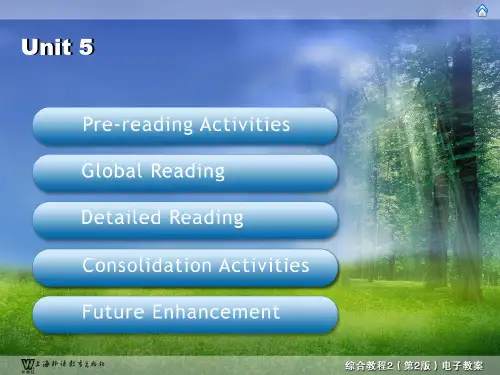
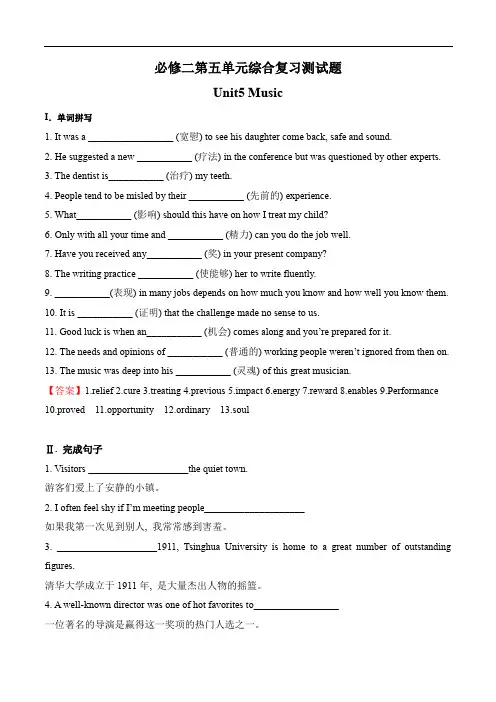
必修二第五单元综合复习测试题Unit5 MusicI.单词拼写1. It was a _________________ (宽慰) to see his daughter come back, safe and sound.2. He suggested a new ___________ (疗法) in the conference but was questioned by other experts.3. The dentist is___________ (治疗) my teeth.4. People tend to be misled by their ___________ (先前的) experience.5. What___________ (影响) should this have on how I treat my child?6. Only with all your time and ___________ (精力) can you do the job well.7. Have you received any___________ (奖) in your present company?8. The writing practice ___________ (使能够) her to write fluently.9. ___________(表现) in many jobs depends on how much you know and how well you know them.10. It is ___________ (证明) that the challenge made no sense to us.11. Good luck is when an___________ (机会) comes along and you’re prepared for it.12. The needs and opinions of ___________ (普通的) working people weren’t ignored from then on.13. The music was deep into his ___________ (灵魂) of this great musician.【答案】1.relief 2.cure 3.treating 4.previous 5.impact 6.energy 7.reward 8.enables 9.Performance 10.proved 11.opportunity 12.ordinary 13.soulⅡ. 完成句子1. Visitors ____________________the quiet town.游客们爱上了安静的小镇。
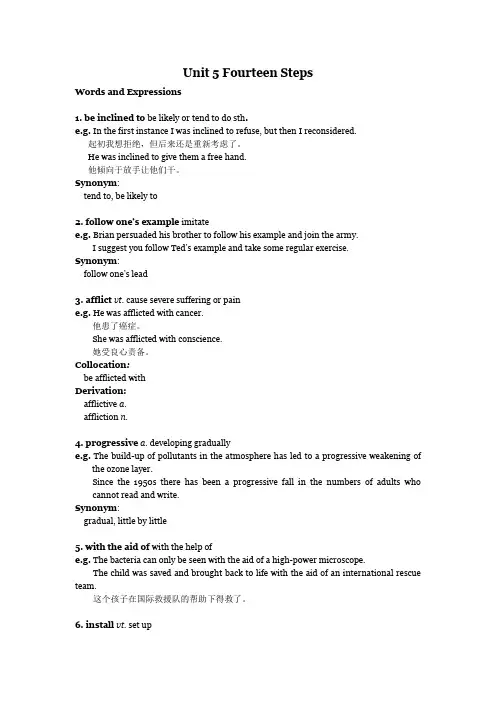
Unit 5 Fourteen StepsWords and Expressions1. be inclined to be likely or tend to do sth.e.g. In the first instance I was inclined to refuse, but then I reconsidered.起初我想拒绝,但后来还是重新考虑了。
He was inclined to give them a free hand.他倾向于放手让他们干。
Synonym:tend to, be likely to2.follow one’s example imitatee.g. Brian persuaded his brother to follow his example and join the army.I suggest you follow Ted’s example and take some regular exercise.Synonym:follow one’s lead3. afflict vt. cause severe suffering or paine.g. He was afflicted with cancer.他患了癌症。
She was afflicted with conscience.她受良心责备。
Collocation:be afflicted withDerivation:afflictive a.affliction n.4.progressive a. developing graduallye.g. The build-up of pollutants in the atmosphere has led to a progressive weakening ofthe ozone layer.Since the 1950s there has been a progressive fall in the numbers of adults who cannot read and write.Synonym:gradual, little by little5. with the aid of with the help ofe.g. The bacteria can only be seen with the aid of a high-power microscope.The child was saved and brought back to life with the aid of an international rescue team.这个孩子在国际救援队的帮助下得救了。
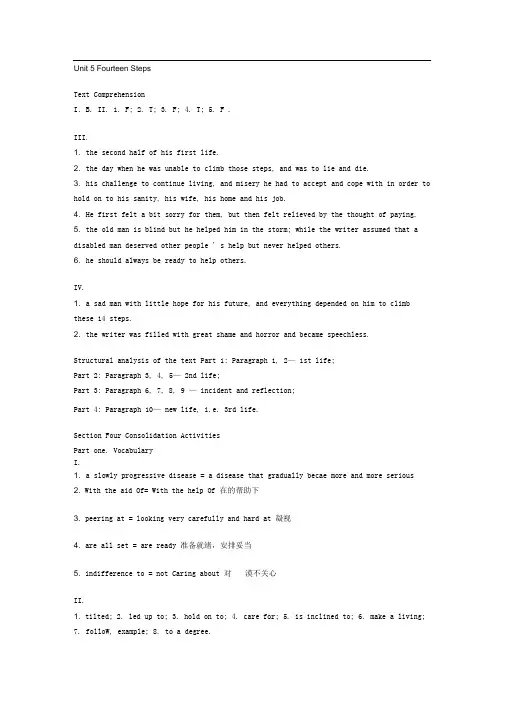
Unit 5 Fourteen StepsText ComprehensionI.B. II. 1. F; 2. T; 3. F; 4. T; 5. F .III.1. the second half of his first life.2. the day when he was unable to climb those steps, and was to lie and die.3. his challenge to continue living, and misery he had to accept and cope with in order to hold on to his sanity, his wife, his home and his job.4. He first felt a bit sorry for them, but then felt relieved by the thought of paying.5. the old man is blind but he helped him in the storm; while the writer assumed that a disabled man deserved other people ' s help but never helped others.6. he should always be ready to help others.IV.1. a sad man with little hope for his future, and everything depended on him to climb these 14 steps.2. the writer was filled with great shame and horror and became speechless.Structural analysis of the text Part 1: Paragraph 1, 2— 1st life;Part 2: Paragraph 3, 4, 5— 2nd life;Part 3: Paragraph 6, 7, 8, 9 — incident and reflection;Part 4: Paragraph 10— new life, i.e. 3rd life.Section Four Consolidation ActivitiesPart one. VocabularyI.1. a slowly progressive disease = a disease that gradually becae more and more serious2. With the aid Of= With the help Of 在的帮助下3. peering at = looking very carefully and hard at 凝视4. are all set = are ready 准备就绪,安排妥当5. indifference to = not Caring about 对漠不关心II.1. tilted;2. led up to;3. hold on to;4. care for;5. is inclined to;6. make a living;7. folloW, example; 8. to a degree.III. Word derivationFill in the blanks With the appropriate forms of the given Words.1. You always follow your own inclination (incline) instead of thinking of our feeling.2. The men stood in front of the bar, indifferent (indifference) to the argument that was going on across the road.3. The company has had a successful first year at home but penetration (penetrate) of the international market has been slow.4. We hadn ' t seen her for many years and were very shocked by hfrearilty (frail).5. He does not consider his deafness an affliction (afflict).6. We were all very impressed by the excellence (excellent) of the design.7. Her fever is getting progressively (progress) worse. I think we should call a doctor.8. The honeymoon period was soon followed by the usual disillusionment (disillusion) with day-to-day reality.1. i ncline v.使有倾向,易于;爱好inclination n. 倾向,意愿in cli ned a.有倾向的;倾斜的2. indifference n. 不重视,无兴趣,漠不关心 indifferent a. 漠不关心的,冷淡的indifferently ad. 不在乎地,冷淡地,淡然地3. penetrate v. 穿透,渗透;看穿penetrating a. 敏锐的,尖锐的;穿透的,透彻的penetration n. 渗透,侵入,突破4. frail a. 脆弱的,虚弱的frailty n. 脆弱,意志薄弱;弱点5. afflict v. 使苦恼,折磨 affliction n. 痛苦,苦恼,苦难6. excellent a. 极好的,杰出的 excellence n. 优秀,卓越,优点 excellently ad. 优秀地,超群地7. progress n. 进步,发展,前进 progression n. 前进 progressive a. 前进的,渐进的8. disillusion n. 觉醒,幻灭 disillusionment n. 幻灭感 disillusioned a. 大失所望的,幻想破灭的IV.1. A;2. C;3. B;4. D;5. B;6. A;7. D;8. B.IV. Synonym / AntonymGive a synonym or an antonym of the word underlined in each sentence in the sense it is used.1. And I managed to keep my health and optimism, to a degree, because of 14 steps. Antonym: pessimism2. Not so. Here hobbled a bitterly disillusioned cripple, a man who held on to his sanity and his wife and his home and his job because of 14 miserable steps leading up to the b ack door from his garage.Synonym: painfully, desperately3. She went into the house and a moment later came out bundled in raincoat and hat, followed by a man who called a cheerful greeting.Antonym: cheerless, unhappy , gloomy4. I started the engine and thumped slowly along, keeping well over on the shoulder untilI came to the dirt road, where I turned in — thankfully.Synonym: fortunately5. He was an old man, stooped and frail-looking under his slicker. Synonym: weak, delicate, feeble6. As I became older, I became more disillusioned and frustrated.Synonym: disappointed7. I realized that I was filled to overflowing with self-pity, selfishness, indifference to the needs of others and thoughtlessness.Antonym: selflessness, unselfishness8. There followed a long interval of noises.Synonym: periodV. Compounding Write in each space the meaning of each given word.1. likewise2. underway3. carefree4. forthcoming5. stand-by6. user-friendly7. soundproof8. landlocked in the same wayin progress with no concerncoming soon something ready for use handy to use preventing the passage of sound almost or entirely surrounded by landPart Two. Grammar Exercises1. NumeralsCardinal 基数 numerals express integer 整数 (whole) abstract numbers, or the number / amount of the determined nouns in literal form. In addition to being numerals determining nouns, cardinal numerals may also work as:1. adjectives2. nouns3. numeral — One Il Can also be a PronoUnThe different WayS to express — around around, about, nearly, some, more or less, or so, thereaboUts, etC.Ordinal 序数 numerals are used to express an / the order in a series. In addition to being numerals determining nouns, ordinal numerals may also work as:1. adjeCtives2. nouns3. adverbsOrdinal numerals allow both artiCles ahead. Again, the artiCle determines the noun only, not the numeral.FraCtional numeral is used to express parts of a whole. Commonly, it takes two forms:1. Common 普通分数 /简分数 fraCtionWork aCCording to the formula: Wholes + Numerator / Denominatore. g. 1 2/3 = (is equal to or means) one (whole) and / plus two thirdsNote the — S Il added to the denominator: — thirds II.2. DeCimal 小数 numbersWork aCCording to the formula: Whole numbers (point) deCimalse. g. 12.15 = (is equal to or means) twelve fifteen, or twelve point fifteenI . different WayS to ex PreSS — around II.I. About 100 students; 2. more or less 40 pages; 3. There are 30 or so questions; 4. two hours or thereabouts; 5. some four miles; 6. 50ish.II.1. a nap 合一会儿眼 ;2. very good indeed 百里挑一 ;3. in a mess 乱七八糟 ;4. on hands and knees 四脚爬 ;5. very muCh better than you are 比你强十倍 ;6. talking quiCkly and Continuously;7. very probably 十有八九 ;8. a lot Ways 千万条路子 .II. CorreCt the errors in the folloWing sentenCes.1. He Was not due at the offiCe for another three-quarter (attributive-adjeCtive) (three quarters) of an hour.2. WaS were.3. This is the Worst disaster I Can remember in my plus 25 years (25 years plus) as apoliCe offiCer.4. SeC Ond time -a SeC Ond time.5. See -have See n. (PreSe nt PerfeCt)6. It took him one and a half hours to finish the task.7. TWenty-nine (beginning)2. Determiners (both, each, either or neither, some, any)Determiners are used in front of nouns to indicate whether you are referring to something specific or something of a particular type.Both is used to indicate that the action or state denoted by the verb applies individually to each of the two entities. When both is used with and to link parallel elements in a sentence, the words or phrases that follow them should correspond grammatically. Both can only collocate with plural count nouns.e. g. Both her fingers are broken.Both Mary and Tom like reading English novels.The phrase beginning with each identifies a set of items wherein the words following each identify the individual elements by their shared characteristics. The phrase is grammatically singular in number, so if the phrase is the subject of a sentence, its verb is conjugated into a third-person singular form. Similarly, any pronouns that refer to the noun phrase are singular.e. g. Each candidate has 49 votes.Each voter must decide for herself.Either and neither are used in sentences concerning a possible choice between two items. Either can mean one or the other (of two) or each of two.e.g. I ' ve got tea and coffee, so you can have either.e(o nr the other)The room has a door at either end. (both)Neither means not the first one and not the second one.e. g. Neither of the students were listening.Both, some and any appear before nouns. Some and any may be used with countable and uncountable nouns.e. g. He bought some sandwiches for lunch.He didn ' t see any stars when he visited Hollywood.He ate some cheese with his sandwiches.He never drinks any coffee at night because then he can ' t sleep.IV.Both, both, Neither, either, neither. both, each, either.V. Fill in each of the blanks with some, any or one of their compounds.1. somewhat2. The repairs will cost _____________ something in the region of $500.3. I was amazed that __ some ____ 400 people came to the meeting to discuss the new schemefor a shopping center.4. somehow, anything5. anything, something6. George ought to be able to tell whether that old plate is valuable. He is___something___ of anexpert on china.7. What have you been up to? I havent seen ___anythiungfo_r_a_goefsy.o8. someVI.1. In spite of + noun--2. It seemed to me that + clause-Part Three. Translation exercisesI. English to Chinese1. 常言道猫有九命,我信这话。
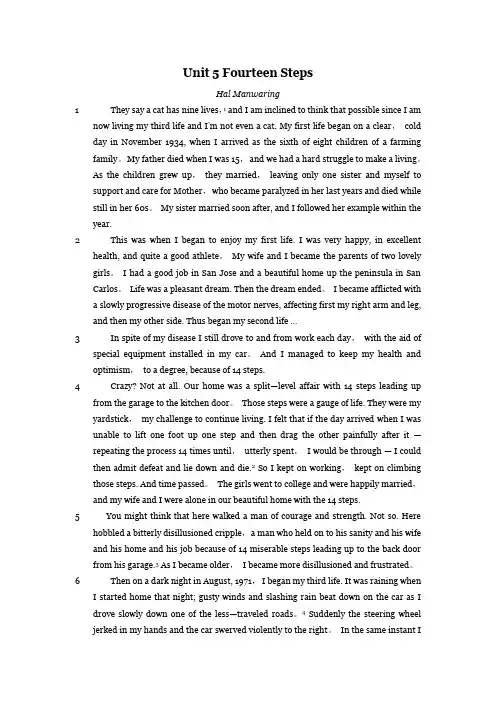
Unit 5 Fourteen StepsHal Manwaring1They say a cat has nine lives,1 and I am inclined to think that possible since I am now living my third life and I’m not even a cat. My first life began on a clear,cold day in November 1934, when I arrived as the sixth of eight children of a farming family。
My father died when I was 15,and we had a hard struggle to make a living。
As the children grew up,they married,leaving only one sister and myself to support and care for Mother,who became paralyzed in her last years and died while still in her 60s。
My sister married soon after, and I followed her example within the year.2This was when I began to enjoy my first life. I was very happy, in excellent health, and quite a good athlete。
My wife and I became the parents of two lovely girls。
I had a good job in San Jose and a beautiful home up the peninsula in San Carlos。
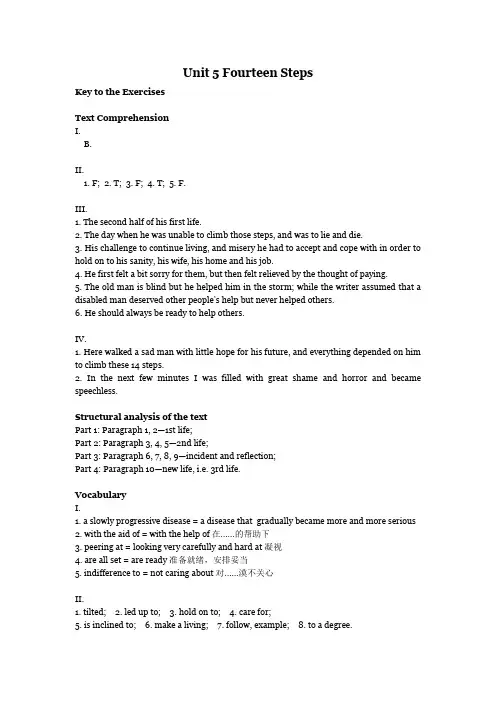
Unit 5 Fourteen StepsKey to the ExercisesText ComprehensionI.B.II.1. F;2. T;3. F;4. T;5. F.III.1. The second half of his first life.2. The day when he was unable to climb those steps, and was to lie and die.3. His challenge to continue living, and misery he had to accept and cope with in order to hold on to his sanity, his wife, his home and his job.4. He first felt a bit sorry for them, but then felt relieved by the thought of paying.5. The old man is blind but he helped him in the storm; while the writer assumed that a disabled man deserved other people’s help but never helped others.6. He should always be ready to help others.IV.1. Here walked a sad man with little hope for his future, and everything depended on him to climb these 14 steps.2. In the next few minutes I was filled with great shame and horror and became speechless.Structural analysis of the textPart 1: Paragraph 1, 2—1st life;Part 2: Paragraph 3, 4, 5—2nd life;Part 3: Paragraph 6, 7, 8, 9—incident and reflection;Part 4: Paragraph 10—new life, i.e. 3rd life.VocabularyI.1. a slowly progressive disease = a disease that gradually became more and more serious2. with the aid of = with the help of 在……的帮助下3. peering at = looking very carefully and hard at 凝视4. are all set = are ready 准备就绪,安排妥当5. indifference to = not caring about 对……漠不关心II.1. tilted;2. led up to;3. hold on to;4. care for;5. is inclined to;6. make a living;7. follow, example;8. to a degree.III. Word derivationFill in the blanks with the appropriate forms of the given words.1. inclination2. indifferent3. penetration4. frailty5. affliction6. excellence7. progressively8. disillusionmentIV.1. A;2. C;3. B;4. D;5. B;6. A;7. D;8. B.V. Synonym / AntonymGive a synonym or an antonym of the word underlined in each sentence in the sense it is used.1. Antonym: pessimism2. Synonym: painfully, desperately3. Antonym: cheerless, unhappy, gloomy4. Synonym: fortunately5. Synonym: weak, delicate, feeble6. Synonym: disappointed7. Antonym: selflessness, unselfishness8. Synonym: periodVI. CompoundingWrite in each space the meaning of each given word.1. likewise in the same way2. underway in progress3. carefree with no concern4. forthcoming coming soon5. stand-by something ready for use6. user-friendly handy to use7. soundproof preventing the passage of sound8. landlocked almost or entirely surrounded by landGrammar ExercisesI. D ifferent ways to express “around”.1. About 100 students;2. more or less 40 pages;3. There are 30 or so questions;4. two hours or thereabouts;5. some four miles;6. 50ish.II.1. a nap合一会儿眼;2. very good indeed百里挑一;3. in a mess乱七八糟;4. on hands and knees四脚爬;5. very much better than you are比你强十倍;6. talking quickly and continuously;7. very probably十有八九;8. a lot ways千万条路子.III. Correct the errors in the following sentences.1. three-quarter → three quarters2. was → were.3. plus 25 years →25 years plus4. second time → a second time5. see → have seen6. hour → hours7. Twenty-nine (beginning)IV.Both, both, Neither, either, neither.both, each, either.V. Fill in each of the blanks with some, any or one of their compounds.1. somewhat2. something3. some4. somehow, anything5. anything, something6. something7. anything8. someTranslation exercisesI. English to Chinese1. 常言道猫有九命,我信这话。
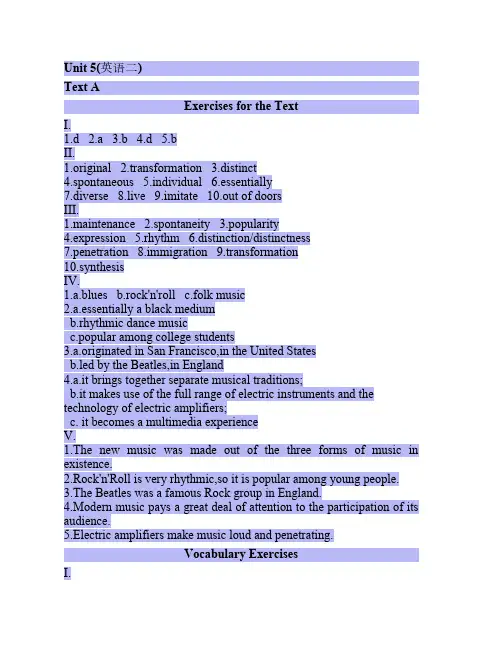
Unit 5(英语二)Text AExercises for the TextI.1.d2.a3.b4.d5.bII.1.original2.transformation3.distinct4.spontaneous5.individual6.essentially7.diverse 8.live 9.imitate 10.out of doorsIII.1.maintenance2.spontaneity3.popularity4.expression5.rhythm6.distinction/distinctness7.penetration 8.immigration 9.transformation10.synthesisIV.1.a.blues b.rock'n'roll c.folk music2.a.essentially a black mediumb.rhythmic dance musicc.popular among college students3.a.originated in San Francisco,in the United Statesb.led by the Beatles,in England4.a.it brings together separate musical traditions;b.it makes use of the full range of electric instruments and the technology of electric amplifiers;c. it becomes a multimedia experienceV.1.The new music was made out of the three forms of music in existence.2.Rock'n'Roll is very rhythmic,so it is popular among young people.3.The Beatles was a famous Rock group in England.4.Modern music pays a great deal of attention to the participation of its audience.5.Electric amplifiers make music loud and penetrating.Vocabulary ExercisesI.1.a.music b.musical c.musically d.musician2.a.conscious b.Consciousness c.consciously3.a.limited b.limits c.limitations d.limitless4.a.original b.originated c.origianlityII.1.synthesis2.studio3.spontaneous4.readily5.passive6.multimedia7.distinct 8.sentiment 9.anti-war10.EclecticismIII.1.This chapter is on the transformation of heat energy into dynamic energy.2.A group of people gathered spontaneously on the spot of the accident.3.The quarrel originated form misunderstanding.4.The army took over the city after 1949.5.You should not take on too much work for the sake of your health.Text BExercises for the TextI.1.T2.T3.F4.T5.T6.T7.F8.T9.T 10.FII.1.the spontaneously inspired type; the constructive; the traditionalist type2.wellpleted composition; musical theme4.the shorter; a stretch5.creative; musical theme6.notebooks7.preliminary8.pattern; theme9.for the sake of10.harmonies; sonorities; formal principlesVocabulary ExercisesI.1.a2.b3.b4.b5.aII.1.不变地常变的多样化多种多样的2.有创造力的创造创造3.作曲家创作作品4.特有的特性塑造特性特性塑造5.各种各样的多样化的使不同多样性6.传统传统的传统主义者7.建造建设性的建筑8.果实有收益的无收获的Grammar Exercises。
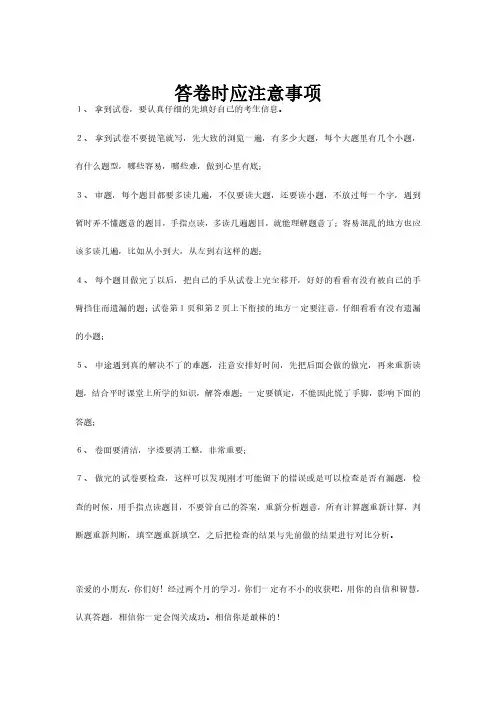
答卷时应注意事项1、拿到试卷,要认真仔细的先填好自己的考生信息。
2、拿到试卷不要提笔就写,先大致的浏览一遍,有多少大题,每个大题里有几个小题,有什么题型,哪些容易,哪些难,做到心里有底;3、审题,每个题目都要多读几遍,不仅要读大题,还要读小题,不放过每一个字,遇到暂时弄不懂题意的题目,手指点读,多读几遍题目,就能理解题意了;容易混乱的地方也应该多读几遍,比如从小到大,从左到右这样的题;4、每个题目做完了以后,把自己的手从试卷上完全移开,好好的看看有没有被自己的手臂挡住而遗漏的题;试卷第1页和第2页上下衔接的地方一定要注意,仔细看看有没有遗漏的小题;5、中途遇到真的解决不了的难题,注意安排好时间,先把后面会做的做完,再来重新读题,结合平时课堂上所学的知识,解答难题;一定要镇定,不能因此慌了手脚,影响下面的答题;6、卷面要清洁,字迹要清工整,非常重要;7、做完的试卷要检查,这样可以发现刚才可能留下的错误或是可以检查是否有漏题,检查的时候,用手指点读题目,不要管自己的答案,重新分析题意,所有计算题重新计算,判断题重新判断,填空题重新填空,之后把检查的结果与先前做的结果进行对比分析。
亲爱的小朋友,你们好!经过两个月的学习,你们一定有不小的收获吧,用你的自信和智慧,认真答题,相信你一定会闯关成功。
相信你是最棒的!Unit 5 单元测试一、听力(共两节,满分30分)第一节(共5小题;每小题1.5分,满分7.5分)听下面5段对话。
每段对话后有一个小题,从题中所给的A、B、C三个选项中选出最佳选项,并标在试卷的相应位置。
听完每段对话后,你都有10秒钟的时间来回答有关小题和阅读下一小题。
每段对话仅读一遍。
1. What season is it now?A. Summer.B. Autumn.C. Winter.2. What does the man think of himself?A. He deserves a free lunch.B. His salary is not high.C. He works hard.3. What is the problem with the woman’s English?A. Her spelling is very poor.B. Her speaking is not good.C. Her pronunciation is not good.4. What are the two speakers talking about?A. A new movie.B. A weekend plan.C. Steve’s cousin.5. How does the woman feel?A. Worried.B. Annoyed.C. Surprised.第二节(共15小题;每小题1.5分,满分22.5分)听下面5段对话或独白。
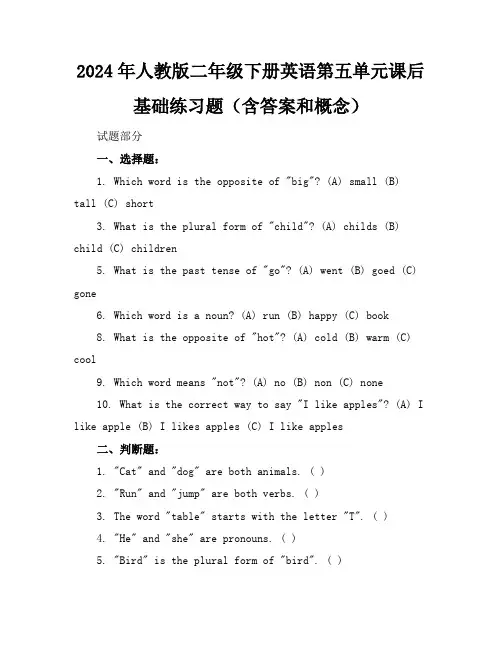
2024年人教版二年级下册英语第五单元课后基础练习题(含答案和概念)试题部分一、选择题:1. Which word is the opposite of "big"? (A) small (B)tall (C) short3. What is the plural form of "child"? (A) childs (B) child (C) children5. What is the past tense of "go"? (A) went (B) goed (C) gone6. Which word is a noun? (A) run (B) happy (C) book8. What is the opposite of "hot"? (A) cold (B) warm (C) cool9. Which word means "not"? (A) no (B) non (C) none10. What is the correct way to say "I like apples"? (A) I like apple (B) I likes apples (C) I like apples二、判断题:1. "Cat" and "dog" are both animals. ( )2. "Run" and "jump" are both verbs. ( )3. The word "table" starts with the letter "T". ( )4. "He" and "she" are pronouns. ( )5. "Bird" is the plural form of "bird". ( )6. The opposite of "old" is "young". ( )7. "Go" and "went" are the same tense. ( )8. "Red" and "blue" are both colors. ( )9. "Eat" is a noun. ( )10. "I am happy" and "I am sad" are both correct sentences. ( )三、填空题:1. My mother is a teacher. She teaches ________.2. The cat is ________ the table.3. I can ________ a bike.4. ________ is my favorite color.5. We go to school ________ days a week.6. She has ________ apples.7. The sun sets in the ________.8. I am ________ years old.9. ________ and ________ are brothers.10. The dog is ________ the house.11. I like to ________ in the park.12. ________ is the largest animal in the world.13. My birthday is in ________.14. He is ________ than me.15. She ________ to the library every weekend.16. The bird is ________ the tree.17. ________ is the capital of France.18. I eat breakfast at ________ in the morning.19. ________ is a planet in our solar system.20. I ________ to the zoo last week.四、简答题:1. What is your favorite fruit? Why do you like it?2. Describe your best friend.3. What do you do after school?4. What is your mother's job? What does she do?5. Where did you go on your last vacation?6. What is your favorite season? Why?7. What do you want to be when you grow up?8. Describe your classroom.9. What is your favorite animal? Why?10. How do you celebrate your birthday?三、填空题答案:1. English2. on3. ride4. Blue5. Five6. seven7. west8. Eight9. Tom and Jerry10. in11. play12. The blue whale13. June14. taller15. goes16. in17. Paris18. seven thirty19. Mars20. went四、简答题答案:1. My favorite fruit is apple because it's sweet and crunchy.2. My best friend is tall and has brown hair. She is very funny and kind.3. After school, I usually do my homework and then play soccer with my friends.4. My mother is a doctor. She takes care of sick people.5. I went to the beach on my last vacation.6. My favorite season is summer because I can swim and have fun outside.7. I want to be a scientist when I grow up.8. My classroom is big and bright. We have colorful posters on the walls.9. My favorite animal is the panda because it's cute and rare.10. I celebrate my birthday with a party and a cake.本综合练习题涵盖了二年级下册英语第五单元的核心知识点,包括词汇、语法、日常对话和简单描述等。
英语基础教程2练习册答案练习一:词汇匹配1. 形容词 - Adjective: a. beautiful2. 动词 - Verb: b. to run3. 名词 - Noun: c. book4. 副词 - Adverb: d. quickly5. 代词 - Pronoun: e. it6. 连词 - Conjunction: f. and7. 介词 - Preposition: g. in8. 冠词 - Article: h. the练习二:填空1. The cat is _beautiful_. (形容词)2. She _runs_ every morning. (动词)3. There is a new _book_ on the table. (名词)4. He speaks English _quickly_. (副词)5. _It_ is raining outside. (代词)6. She likes _and_ enjoys reading. (连词)7. The children are playing _in_ the park. (介词)8. There is a big tree _the_ garden. (冠词)练习三:翻译句子1. 我每天都去图书馆。
- I go to the library every day.2. 他喜欢打篮球。
- He likes playing basketball.3. 她正在学习英语。
- She is studying English.4. 他们计划去旅行。
- They plan to travel.练习四:完形填空In the morning, I usually have breakfast at 7:00. After that, I _go_ to school. My school is not far from my home, so I can walk there. I _like_ my school very much because I have many good friends there. In the afternoon, I often play _sports_ with my friends. After school, I _do_ my homework and then I _watch_ TV for a while. I usually go to bed at 10:00.1. go2. like3. sports4. do5. watch练习五:阅读理解Text:Tom is a young boy who loves to play outside. Every day after school, he goes to the park to play soccer with his friends. He also enjoys reading books about animals and dreams of becoming a zoologist one day.Questions:1. What does Tom like to do after school?- He likes to play soccer at the park.2. What does Tom enjoy reading about?- He enjoys reading books about animals.3. What is Tom's dream job?- His dream job is to become a zoologist.练习六:写作Write a short paragraph about your daily routine.My day usually starts with breakfast at 7:30. After that, I go to school where I have classes until lunchtime. In the afternoon, I often spend time with friends or participate in after-school activities. I finish my homework in the evening and then relax by watching TV or reading a book. I go to bed around 10:00 to get enough rest for the next day.结束语希望这些答案能帮助你更好地学习英语基础教程2。
Page 87Text ComprehensionI.B.II. 1. F; 2. T; 3. F; 4. T; 5. F.III.1. the second half of his first life.2. the day when he was unable to climb those steps, and was to lie and die.3. his challenge to continue living, and misery he had to accept and cope with in order to hold on to his sanity, his wife, his home and his job.4. He first felt a bit sorry for them, but then felt relieved by the thought of paying.5. the old man is blind but he helped him in the storm; while the writer assumed tha t a disabled man deserved other people’s help but never helped others.6. he should always be ready to help others.IV.1. a sad man with little hope for his future, and everything depended on him to climb these 14 steps.2. the writer was filled with great shame and horror and became speechless.Page 88VocabularyI.1. a disease that gradually became more and more serious2. with the help of 在……的帮助下3. looking very carefully and hard at 凝视4. are ready 准备就绪,安排妥当5. not caring about 对……漠不关心II.1. tilted;2. led up to;3. hold on to;4. care for;5. is inclined to;6. make a living;7. follow, example;8. to a degree.Page 89III. Word derivationFill in the blanks with the appropriate forms of the given words.1. You always follow your own inclination (incline) instead of thinking of our feeling.2. The men stood in front of the bar, indifferent (indifference) to the argument that was going on across the road.3. The company has had a successful first year at homebut penetration (penetrate) of the international market has been slow.4. We hadn’t seen her for many years and were very shocked byher frailty (frail).5. He does not consider his deafness an affliction (afflict).6. We were all very impressed by the excellence (excellent) of the design.7. Her fever is getting progressively (progress) worse. I think we should call a doctor.8. The honeymoon period was soon followed by theusual disillusionment (disillusion) with day-to-day reality.1. incline v. 使有……倾向,易于;爱好inclination n. 倾向,意愿inclined a. 有……倾向的;倾斜的2. indifference n. 不重视,无兴趣,漠不关心indifferent a. 漠不关心的,冷淡的indifferently ad. 不在乎地,冷淡地,淡然地3. penetrate v. 穿透,渗透;看穿penetrating a. 敏锐的,尖锐的;穿透的,透彻的penetration n. 渗透,侵入,突破4. frail a. 脆弱的,虚弱的frailty n. 脆弱,意志薄弱;弱点5. afflict v. 使苦恼,折磨affliction n.痛苦,苦恼,苦难6. excellent a. 极好的,杰出的excellence n. 优秀,卓越,优点excellently ad.优秀地,超群地7. progress n. 进步,发展,前进progression n. 前进progressive a. 前进的,渐进的8. disillusion n. 觉醒,幻灭disillusionment n. 幻灭感disillusioned a. 大失所望的,幻想破灭的IV.1. A;2. C;3. B;4. D;5. B;6. A;7. D;8. B.Page 90V. Synonym / AntonymGive a synonym or an antonym of the word underlined in each sentence in the sense it is used.1. And I managed to keep my health and optimism, to a degree, because of 14 steps.Antonym: pessimism2. Not so. Here hobbled a bitterly disillusioned cripple, a man who held on to his sanity and his wife and his home and his job because of 14 miserable steps leading up to the back door from his garage. Synonym: painfully, desperately3. She went into the house and a moment later came out bundled in raincoat and hat, followed by a man who called a cheerful greeting. Antonym: cheerless, unhappy, gloomy4. I started the engine and thumped slowly along, keeping well over on the shoulder until I came to the dirt road, where I turned in —thankfully.Synonym: fortunately5. He was an old man, stooped and frail-looking under his slicker. Synonym: weak, feeble6. As I became older, I became more disillusioned and frustrated. Synonym: disappointed7. I realized that I was filled to overflowing with self-pity, selfishness, indifference to the needs of others andthoughtlessness.Antonym: selflessness, unselfishness8. There followed a long interval of noises.Synonym: periodVI. CompoundingWrite in each space the meaning of each given word.1. likewise in the sameway2. underway inprogress3. carefree with noconcern4. forthcoming comingsoon5. stand-by something ready foruse6. user-friendly handy touse7. soundproof preventing the passage of sound8. landlocked almost or entirely surrounded by landGrammarPage 91I.different ways to express “around”.1. About 100 students;2. more or less 40 pages;3. There are 30 or so questions;4. two hours or thereabouts;5. some four miles;6. 50ish.II.1.常言道猫有九命,我信这话。
Unit 5 Fourteen StepsSection One Pre-reading Activities ..............................................................错误!未定义书签。
I. Audiovisual supplement ............................... 错误!未定义书签。
II. Cultural information ................................ 错误!未定义书签。
Section Two Global Reading .................................. 错误!未定义书签。
I. Main idea ............................................ 错误!未定义书签。
II. Structural analysis ................................. 错误!未定义书签。
Section Three Detailed Reading .............................. 错误!未定义书签。
Text I .................................................. 错误!未定义书签。
Section Four Consolidation Activities ........................ 错误!未定义书签。
I . Vocabulary Analysis ................................. 错误!未定义书签。
II Grammar Exercises .................................... 错误!未定义书签。
III. Translation exercises .............................. 错误!未定义书签。
高中英语必修二第五单元1.古典的2..滚动;(使)摇晃n.摇晃;卷;卷形物;面包圈3.管弦乐队4.说唱乐5.民间的6.爵士乐7.合唱队的8.音乐家9.梦见;梦想;设想10.假装;假扮11.说实在地;实话说12.系上;附加;连接13.认为有(重要性、意义);附上;连接14.组成;形成;构成15.名声;名望16.过路人;行人17.赚;挣得;获得18.额外的;外加的19.表演;履行;执行20.酒馆;酒吧21.现金22.用现金;有现钱23.工作室;演播室24.百万富翁;富豪25.戏弄26.男演员;行动者27.依赖;依靠28.依赖;依靠29..广播;播放30.幽默的;诙谐的31.熟悉的;常见的;亲近的32.熟悉;与…熟悉起来33.大约34.打碎;分裂;解体35.吸引人的;有吸引力的36.加;增加;加法37.另外;也38.分类39.兴奋;刺激40.在晚上;在夜里;(口)很快;一夜之间41.浸;蘸42.自信的;确信的43.简短的;简要的n.摘要;大纲44.简要地;短暂地45.投入;热爱46.然后;后来47.邀请;招待48.胡须49.敏感的;易受伤害的;灵敏的50..痛苦的;疼痛的51.最重要;首先Unit 51.翻身, 打滚2.梦见, 梦想…3在音乐会上4. 对…诚实4.养成…的习惯5. 路人(复数)6.赚外快6. 给某人做某事的机会7.捉弄,笑;取笑8. 以….为基础, 基于….9.做音乐10.破裂;拆散;停止;(战争等)爆发闯进中断;停止坏掉,发生故障;(身体)垮掉11击中某人的…12.偶然,意外地13.偶然遇见14. 分类15.对……有信心16.演出,表演17.出了毛病18.从那时起19.提出20. 坚持做某事21.首先,最重要的是23. 吸引某人的注意力/兴趣22 演奏乐器句子:1.一些人从不满意。
2.他假装要外出。
3.我进来的时候,他假装在读书。
4.汤姆假装读完了那本书。
5.你也需要依靠我帮你。
6.学校将会在两周后放假。
温馨提示:此套题为Word版,请按住Ctrl,滑动鼠标滚轴,调节合适的观看比例,答案解析附后.关闭Word文档返回原板块。
Ⅰ. 微语法填空温馨提示: 加黑部分为复现前面知识I used to decline invitations(invite)to parties to protect myself from being affected by alcohol, because I was sensitive (sense)to alcohol. But three years ago,when I visited a distant tourist attraction (attract)in Jiangsu, I turned up at a party where I met my wife, a musician(music), for the first time。
When asked to give a performance(perform) at the party,we both responded to the request warmly,full of confidence (confident)。
We fell in love because we left each other a good impression. Briefly (brief)speaking,she appreciated my humorous(humor) words and graceful behaviour, and I was conquered by the way she behaved and treated others.Ⅱ.完成句子1. I’m preparing my latest Cantonese and Putonghua albums,both of which will probably be released this morning。
基础英语2第五单元练习答案Fourteen StepsUnit 5 Fourteen StepsText ComprehensionI.B. II. 1. F; 2. T; 3. F; 4. T; 5. F.III.1. the second half of his first life.2. the day when he was unable to climb those steps, and was to lie and die.3. his challenge to continue living, and misery he had to accept and cope with in order to hold on to his sanity, his wife, his home and his job.4. He first felt a bit sorry for them, but then felt relieved by the thought of paying.5. the old man is blind but he helped him in the storm; while the writer assumed that a disabled man deserved other people’s help but never helped others.6. he should always be ready to help others.IV.1. a sad man with little hope for his future, and everything depended on him to climb these 14 steps.2. the writer was filled with great shame and horror and became speechless.Structural analysis of the textPart 1: Paragraph 1, 2—1st life;Part 2: Paragraph 3, 4, 5—2nd life;Part 3: Paragraph 6, 7, 8, 9—incident and reflection;Part 4: Paragraph 10—new life, i.e. 3rd life.Section Four Consolidation ActivitiesPart one. VocabularyI.1. a slowly progressive disease = a disease that gradually become more and more serious2. with the aid of = with the help of 在……的帮助下3. peering at = looking very carefully and hard at 凝视4. are all set = are ready 准备就绪,安排妥当5. indifference to = not caring about 对……漠不关心II.1. tilted;2. led up to;3. hold on to;4. care for;5. is inclined to;6. make a living;7. follow, example;8. to a degree.III. Word derivationFill in the blanks with the appropriate forms of the given words.1. You always follow your own inclination (incline) instead of thinking of our feeling.2. The men stood in front of the bar, indifferent (indifference) to the argument that was going on across the road.3. The company has had a successful first year at home but penetration (penetrate) of the international market has been slow.4. We hadn’t seen her for many years and were very shocked by her frailty (frail).5. He does not consider his deafness an affliction (afflict).6. We were all very impressed by the excellence (excellent) of the design.7. Her fever is getting progressively (progress) worse. I think we should call a doctor.8. The honeymoon period was soon followed by the usual disillusionment (disillusion) with day-to-day reality.1. incline v. 使有……倾向,易于;爱好inclination n. 倾向,意愿inclined a. 有……倾向的;倾斜的2. indifference n. 不重视,无兴趣,漠不关心indifferent a. 漠不关心的,冷淡的indifferently ad. 不在乎地,冷淡地,淡然地3. penetrate v. 穿透,渗透;看穿penetrating a. 敏锐的,尖锐的;穿透的,透彻的penetration n. 渗透,侵入,突破4. frail a. 脆弱的,虚弱的frailty n. 脆弱,意志薄弱;弱点5. afflict v. 使苦恼,折磨affliction n. 痛苦,苦恼,苦难6. excellent a. 极好的,杰出的excellence n. 优秀,卓越,优点excellently ad. 优秀地,超群地7. progress n. 进步,发展,前进progression n. 前进progressive a. 前进的,渐进的8. disillusion n. 觉醒,幻灭disillusionment n. 幻灭感disillusioned a. 大失所望的,幻想破灭的1. A;2. C;3. B;4. D;5. B;6. A;7. D;8. B.V. Synonym / AntonymGive a synonym or an antonym of the word underlined in each sentence in the sense it is used. 1. And I managed to keep my health and optimism, to a degree, because of 14 steps.Antonym: pessimism2. Not so. Here hobbled a bitterly disillusioned cripple, a man who held on to his sanity and his wife and his home and his job because of 14 miserable steps leading up to the back door from his garage.Synonym: painfully, desperately3. She went into the house and a moment later came out bundled in raincoat and hat, followed by a man who called a cheerful greeting.Antonym: cheerless, unhappy, gloomy4. I started the engine and thumped slowly along, keeping well over on the shoulder until I came to the dirt road, where I turned in — thankfully.Synonym: fortunately5. He was an old man, stooped and frail-looking under his slicker.Synonym: weak, delicate, feeble6. As I became older, I became more disillusioned and frustrated.Synonym: disappointed7. I realized that I was filled to overflowing with self-pity, selfishness, indifference to the needs of others and thoughtlessness.Antonym: selflessness, unselfishness8. There followed a long interval of noises.Synonym: periodVI. CompoundingWrite in each space the meaning of each given word.1. likewise in the same way2. underway in progress3. carefree with no concern4. forthcoming coming soon5. stand-by something ready for use6. user-friendly handy to use7. soundproof preventing the passage of sound8. landlocked almost or entirely surrounded by landPart Two. Grammar Exercises1. NumeralsCardinal 基数numerals express integer 整数(whole) abstract numbers, or the number / amount of the determined nouns in literal form. In addition to being numerals determining nouns, cardinal numerals may also work as:1. adjectives2. nouns3. numeral “one” can also be a pronounThe different ways to express “around”: around, a bout, nearly, some, more or less, or so, thereabouts, etc.Ordinal 序数numerals are used to express an / the order in a series. In addition to being numerals determining nouns, ordinal numerals may also work as:1. adjectives2. nouns3. adverbsOrdinal numerals allow both articles ahead. Again, the article determines the noun only, not the numeral.Fractional numeral is used to express parts of a whole. Commonly, it takes two forms:1. Common 普通分数/简分数fractionWork according to the formula: Wholes + Numerator / Denominatore. g. 1 2/3 = (is equal to or means) one (whole) and / plus two thirdsNote the “s” added to the denominator: “thirds”.2. Decimal 小数numbersWork according to the formula: Whole numbers (point) decimalse. g. 12.15 = (is equal to or means) twelve fifteen, or twelve point fifteenI.different ways to express “around”.1. About 100 students;2. more or less 40 pages;3. There are 30 or so questions;4. two hours or thereabouts;5. some four miles;6. 50ish.II.1. a nap合一会儿眼;2. very good indeed百里挑一;3. in a mess乱七八糟;4. on hands and knees四脚爬;5. very much better than you are比你强十倍;6. talking quickly and continuously;7. very probably十有八九; 8. a lot ways千万条路子.III. Correct the errors in the following sentences.1. He was not due at the office for another three-quarter (attributive-adjective) (three quarters) of an hour.2. was –were.3. This is the worst disaster I can remember in my plus 25 years (25 years plus) as a police officer.4. second time –a second time.5. see –have seen. (present perfect)6. It took him one and a half hours to finish the task.7. Twenty-nine (beginning)2. Determiners (both, each, either or neither, some, any)Determiners are used in front of nouns to indicate whether you are referring to something specific or something of a particular type.Both is used to indicate that the action or state denoted by the verb applies individually to each of the two entities. When both is used with and to link parallel elements in a sentence, the words or phrases that follow them should correspond grammatically. Both can only collocate with plural count nouns.e. g. Both her fingers are broken.Both Mary and Tom like reading English novels.The phrase beginning with each identifies a set of items wherein the words following each identify the individual elements by their shared characteristics. The phrase is grammatically singular in number, so if the phrase is the subject of a sentence, its verb is conjugated into a third-person singular form. Similarly, any pronouns that refer to the noun phrase are singular.e. g. Each candidate has 49 votes.Each voter must decide for herself.Either and neither are used in sentences concerning a possible choice between two items. Either can mean one or the other (of two) or each of two.e.g. I’ve got tea and coffee, so you can have either. (on e or the other)The room has a door at either end. (both)Neither means not the first one and not the second one.e. g. Neither of the students were listening.Both, some and any appear before nouns. Some and any may be used with countable and uncountable nouns.e. g. He bought some sandwiches for lunch.He didn’t see any stars when he visited Hollywood.He ate some cheese with his sandwiches.He never drinks any coffee at night because then he can’t sleep.IV.Both, both, Neither, either, neither.both, each, either.V. Fill in each of the blanks with some, any or one of their compounds.1. somewhat2. The repairs will cost ____ something ____ in the region of $500.3. I was amazed that ____some_____ 400 people came to the meeting to discuss the new scheme for a shopping center.4. somehow, anything5. anything, something6. George ought to be able to tell whether that old plate is valuable. He is ___something___ of an expert on china.7. What have you been up to? I haven’t seen ___anything___ of yo u for ages.8. someVI.1. In spite of + noun--2. It seemed to me that + clause--Part Three. Translation exercisesI. English to Chinese1. 常言道猫有九命,我信这话。